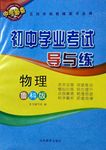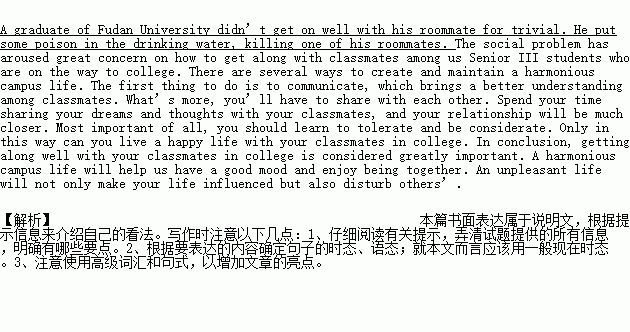ΧβΡΩΡΎ»ί
Directions: Write an English composition according to the instructions given below in ChineseΘ°
Η¥Β©¥σ―ß“Μ―–ΨΩ…ζ“ρΤΫ ±Υω ¬ΚΆΆ§―ß≤ΜΚΆΘ§‘Ύ«ό ““ϊ”ΟΥ°άοΆΕΕΨΘ§ΒΦ÷¬“Μ “”―ΥάΆωΓΘΉςΈΣΦ¥ΫΪΧΛ»κ¥σ―ß–ΘΟ≈ΒΡΡψΘ§ΧΗΧΗΚΆΆ§―ßΚΆ–≥œύ¥ΠΒΡ÷Ί“Σ–‘“‘ΦΑΡψΒΡ“Μ–©Ϋ®“ιΓΘ
ΉΔ“βΘΚ1Θ°¥ ΐ≤Μ…Ό”Ύ120ΗωΘΜ
2Θ°≤ΜΡή Ι”Ο’φ Β–’ΟϊΚΆ―ß–ΘΟϊ≥Τ,
3Θ°ΈΡ’¬ΩΣΆΖ“―Ηχ≥ω, ≤ΜΦΤ»κΉ÷ ΐΓΘ
A graduate of Fudan University didnΓ·t get on well with his roommates for trivialΘ°So he put some poison in the drinking water, killing one of his roommatesΘ°
___________________________________________________________________________
___________________________________________________________________________
___________________________________________________________________________
___________________________________________________________________________
___________________________________________________________________________
___________________________________________________________________________
 ΤΏ–«ΆΦ ιΩΎΥψΥΌΥψΧλΧλΝΖœΒΝ–¥πΑΗ
ΤΏ–«ΆΦ ιΩΎΥψΥΌΥψΧλΧλΝΖœΒΝ–¥πΑΗ ≥θ÷–―ß“ΒΩΦ ‘ΒΦ”κΝΖœΒΝ–¥πΑΗ
≥θ÷–―ß“ΒΩΦ ‘ΒΦ”κΝΖœΒΝ–¥πΑΗ
